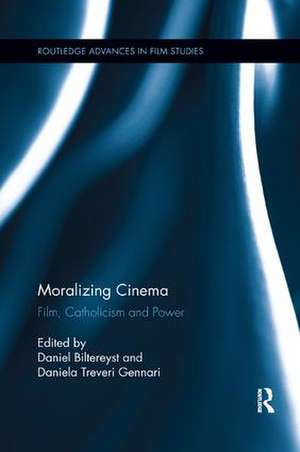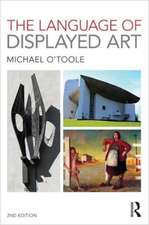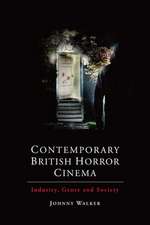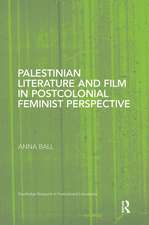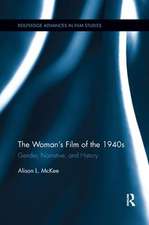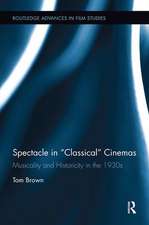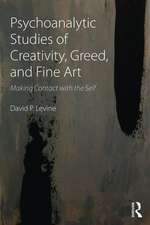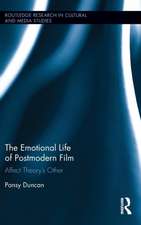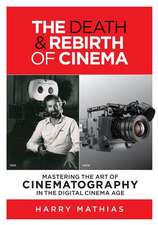Moralizing Cinema: Film, Catholicism, and Power: Routledge Advances in Film Studies
Editat de Daniel Biltereyst, Daniela Treveri Gennarien Limba Engleză Paperback – 6 feb 2018
| Toate formatele și edițiile | Preț | Express |
|---|---|---|
| Paperback (1) | 422.59 lei 43-57 zile | |
| Taylor & Francis – 6 feb 2018 | 422.59 lei 43-57 zile | |
| Hardback (1) | 1112.34 lei 43-57 zile | |
| Taylor & Francis – 3 dec 2014 | 1112.34 lei 43-57 zile |
Din seria Routledge Advances in Film Studies
-
 Preț: 304.12 lei
Preț: 304.12 lei -
 Preț: 310.14 lei
Preț: 310.14 lei -
 Preț: 349.00 lei
Preț: 349.00 lei -
 Preț: 301.92 lei
Preț: 301.92 lei -
 Preț: 310.65 lei
Preț: 310.65 lei -
 Preț: 310.85 lei
Preț: 310.85 lei -
 Preț: 313.47 lei
Preț: 313.47 lei -
 Preț: 364.89 lei
Preț: 364.89 lei -
 Preț: 341.63 lei
Preț: 341.63 lei -
 Preț: 349.09 lei
Preț: 349.09 lei - 18%
 Preț: 1106.81 lei
Preț: 1106.81 lei -
 Preț: 416.06 lei
Preț: 416.06 lei - 18%
 Preț: 1116.02 lei
Preț: 1116.02 lei -
 Preț: 449.05 lei
Preț: 449.05 lei -
 Preț: 388.85 lei
Preț: 388.85 lei - 18%
 Preț: 1118.46 lei
Preț: 1118.46 lei - 18%
 Preț: 1112.34 lei
Preț: 1112.34 lei - 18%
 Preț: 1106.81 lei
Preț: 1106.81 lei - 18%
 Preț: 1106.85 lei
Preț: 1106.85 lei -
 Preț: 382.86 lei
Preț: 382.86 lei -
 Preț: 477.56 lei
Preț: 477.56 lei -
 Preț: 441.20 lei
Preț: 441.20 lei -
 Preț: 387.31 lei
Preț: 387.31 lei - 18%
 Preț: 729.62 lei
Preț: 729.62 lei - 18%
 Preț: 1056.95 lei
Preț: 1056.95 lei - 18%
 Preț: 1058.43 lei
Preț: 1058.43 lei - 18%
 Preț: 1161.62 lei
Preț: 1161.62 lei - 30%
 Preț: 848.15 lei
Preț: 848.15 lei - 18%
 Preț: 1109.99 lei
Preț: 1109.99 lei - 18%
 Preț: 1062.62 lei
Preț: 1062.62 lei -
 Preț: 398.48 lei
Preț: 398.48 lei - 18%
 Preț: 1117.43 lei
Preț: 1117.43 lei - 18%
 Preț: 1115.51 lei
Preț: 1115.51 lei - 18%
 Preț: 1114.30 lei
Preț: 1114.30 lei - 18%
 Preț: 1053.16 lei
Preț: 1053.16 lei - 18%
 Preț: 1057.75 lei
Preț: 1057.75 lei - 30%
 Preț: 820.32 lei
Preț: 820.32 lei - 18%
 Preț: 1112.34 lei
Preț: 1112.34 lei - 18%
 Preț: 1057.75 lei
Preț: 1057.75 lei - 18%
 Preț: 1117.43 lei
Preț: 1117.43 lei
Preț: 422.59 lei
Nou
Puncte Express: 634
Preț estimativ în valută:
80.86€ • 84.64$ • 67.30£
80.86€ • 84.64$ • 67.30£
Carte tipărită la comandă
Livrare economică 31 martie-14 aprilie
Preluare comenzi: 021 569.72.76
Specificații
ISBN-13: 9781138548466
ISBN-10: 1138548464
Pagini: 328
Ilustrații: 69
Dimensiuni: 152 x 229 x 17 mm
Greutate: 0.45 kg
Ediția:1
Editura: Taylor & Francis
Colecția Routledge
Seria Routledge Advances in Film Studies
Locul publicării:Oxford, United Kingdom
ISBN-10: 1138548464
Pagini: 328
Ilustrații: 69
Dimensiuni: 152 x 229 x 17 mm
Greutate: 0.45 kg
Ediția:1
Editura: Taylor & Francis
Colecția Routledge
Seria Routledge Advances in Film Studies
Locul publicării:Oxford, United Kingdom
Public țintă
Postgraduate and UndergraduateCuprins
Catholics, cinema and power: An introduction Daniel Biltereyst and Daniela Treveri Gennari Part 1: Policies 1. Resisting the lure of the modern world. Catholics, international politics, and the establishment of the International Catholic Office for Cinema (1918-1928) Guido Convents 2. The Roman Catholic Church, cinema and the ‘culture of dialogue’: Italian Catholics and the movies after the Second World War Dario Edoardo Viganò 3. The rise and fall of Catholic Hollywood, or from the Production Code to The Da Vinci Code Thomas Doherty 4. Catholicism and Mexican cinema. A secular state, a deeply conservative society and a powerful Catholic hierarchy Francisco Peredo Castro Part 2: Leaders 5. Jean Bernard’s fight for 'good' cinema in Luxembourg Paul Lesch 6. An alternative way of moralizing cinema: Father Flipo’s remedy for the Catholic Church’s propaganda failure in France (1945-1962) Mélisande Leventopoulos 7. A triple alliance for a Catholic neorealism. Roberto Rossellini according to Felix Morlion, Giulio Andreotti and Gian Luigi Rondi Elena Dagrada Part 3: Technology and Production 8. A Catholic voice in talking pictures: the International Eidophon Company (1930-1934) Karel Dibbetts 9. Pius XII as actor and subject: on the representation of the Pope in cinema during the 1940s and 1950s Federico Ruozzi 10. The failed project of a Catholic Neorealism: on Giulio Andreotti, Felix Morlion and Roberto Rossellini Tomaso Subini Part 4:Censorship and control 11. Protectionism and Catholic film policy in twentieth-century Ireland Kevin Rockett 12. A case of entente cordiale between State and Church: Catholics and film control in Argentina (1954-1984) Maria Elena de las Carrera 13. The ‘Ideal Film’. On the transformation of the Italian Catholic film and media policy in the 1950s and the 1960s Mariagrazia Fanchi Part 5: Exhibition and Cinema-going experiences 14. Separating the sheep from the goats: gendering space in the Cinema Auditorium in Rucphen (1929) Thunnis van Oort 15. "I think Catholics didn’t go to the cinema": Catholic film exhibition strategies and cinema-going experiences in Belgium, 1930s-1960s Daniel Biltereyst 16. Moralizing cinema while attracting audiences: Catholic film exhibition in post-war Rome Daniela Treveri Gennari
Notă biografică
Daniel Biltereyst is Full Professor in Film and Cultural Media Studies at Ghent University, Belgium, where he is Head of the Center for Cinema and Media Studies (CIMS). He was the editor of Explorations in New Cinema History (2011) and Cinema, Audiences and Modernity (Routledge, 2012, both with R. Maltby and Ph. Meers), as well as Silencing Cinema (2013, with R. Van de Winkel).
Daniela Treveri Gennari is Reader in Film Studies at Oxford Brookes University, UK. Her work on Catholicism and cinema has been published in her monograph Post-War Italian Cinema: American Intervention, Vatican Interests (Routledge 2008) as well as in articles and book chapters. Her current work on audiences - funded by the AHRC - investigates memories of cinema-going and patterns of exhibition in 1950s Italy.
Daniela Treveri Gennari is Reader in Film Studies at Oxford Brookes University, UK. Her work on Catholicism and cinema has been published in her monograph Post-War Italian Cinema: American Intervention, Vatican Interests (Routledge 2008) as well as in articles and book chapters. Her current work on audiences - funded by the AHRC - investigates memories of cinema-going and patterns of exhibition in 1950s Italy.
Recenzii
"Finally, an investigation that demonstrates the close negotiation between film policies and filmmakers, power and art, ethics and aesthetics, as influenced by a variety of Catholic- inspired initiatives. This is a much-needed intervention into the study of film and culture alike, particularly essential in a day and age when the scrutiny of the power yielded by Catholic institutions is ever more pressing." — Ernest Mathijs, University of British Columbia, Canada
"This is a timely book providing well-researched case studies about the historical influence of religious organizations (in this case the Catholic Church) in the production, distribution, exhibition and consumption of films, from policies and leaders to censorship and audiences. A required text for cinema and media students and scholars interested in a comprehensive analysis of a relevant but under-researched topic. -- Jose-Carlos Lozano, Tecnológico de Monterrey, Mexico
"The strength of Moralizing Cinema lies in the forays into new areas and, not least, in the rich detail of its empirical case studies." --Maaret Koskinen, Communications: The European Journal of Communication Research, 40(4)
"Taken together, this anthology adds considerable depth and complexitiy to the historiography of cinema as a cultural form and inspires contintued study into the networks and linkages between different religious authorities and film institutions." --Ira Wagman, Historical Journal of Film, Radio and Television
"This is a timely book providing well-researched case studies about the historical influence of religious organizations (in this case the Catholic Church) in the production, distribution, exhibition and consumption of films, from policies and leaders to censorship and audiences. A required text for cinema and media students and scholars interested in a comprehensive analysis of a relevant but under-researched topic. -- Jose-Carlos Lozano, Tecnológico de Monterrey, Mexico
"The strength of Moralizing Cinema lies in the forays into new areas and, not least, in the rich detail of its empirical case studies." --Maaret Koskinen, Communications: The European Journal of Communication Research, 40(4)
"Taken together, this anthology adds considerable depth and complexitiy to the historiography of cinema as a cultural form and inspires contintued study into the networks and linkages between different religious authorities and film institutions." --Ira Wagman, Historical Journal of Film, Radio and Television
Descriere
This volume brings together original research on religion and cinema. Contributors look beyond the film text, content, or aesthetics, instead concentrating on the cinema-related actions, strategies, and policies developed by the Catholic Church and Catholic organizations in order to influence cinema.
